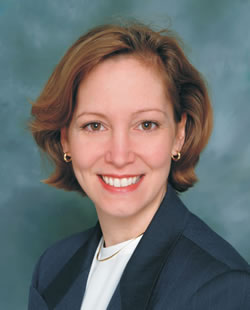News from the APS Director of International Affairs
Amy Flatten

Amy Flatten
Greetings to the members of the Forum on International Physics.
I look forward to working with you to bring you news from the APS International Affairs Office, and to provide you with insights regarding the Society's new efforts in the international physics community.
Most APS members would agree that physics is "international" in nature, but, many may not have realized the large number of APS members that are based outside the United States—nearly 25% of our members (excluding students). Despite our large international membership, however, many of these colleagues have commented in membership surveys that they feel APS activities are "US-centric" and lack relevance to physicists in their region. According to these surveys, most of our international members do not travel to the U.S. for APS meetings, and do not participate in the "APS community" beyond reading journals and receiving Physics Today. Moreover, less than half (46%) of international respondents believed that APS meetings and programming reflect the interests of the international physics community, and overall, only 31% of respondents believed that APS provides international members with ample opportunity to comment upon APS priorities and activities. (1998 APS Non-US Resident Membership Survey) These same members, however, express eagerness to participate in APS more actively.
Collectively, the APS leaders, the Executive Board, and CISA believe this is a critical time to engage our international members, and several new developments should be of particular interest to FIP members:
Additional International Representation on Council
The APS Council has unanimously approved a recommendation for a Constitutional amendment to ensure that international perspectives are effectively represented in the Council, the Society's governing body. Briefly, the proposed changes to the Constitution will enable 4 of the 8 "General" Councillors to be designated as "International Councillors," who will serve 4 year terms. Additional details on the proposed changes are at http://www.aps.org/about/governance/election/index.cfm
International "Friends of APS" Program
The "Friends of APS" program, started in 2000, includes 159 participating U.S. institutions. "Friends" are APS members who have agreed to help facilitate communication with other members at their institution and/or in their local community. While the Friends program has proven itself as a useful tool in communicating with APS members, it currently involves only APS members based in the United States. Expanding this program internationally will strengthen linkages with members and key institutions beyond U.S. borders. Within the next few months we will be contacting APS Fellows and FIP members in cities worldwide (initially starting with 50) for recommendations and/ or nominations for this program.
Support for Local Events Outside of United States
Once the above network is established, APS will invite "International Friends" to submit proposals for a small amount of funds to hold an event at their institution, in their local community, or in conjunction with another local/regional physics meeting. These funds will enable international members to participate in APS events without traveling to the United States, and foster networking among members and collaborative events with other physics organizations. APS will provide additional details (i.e., requirements, fund limits, etc.) for this funding opportunity once the International Friends network is established.
I believe the above initiatives are a good beginning. The APS leadership is continuing to explore how the Society could expand its international engagement. I will not only keep you all apprised of new developments, I will welcome your participation in these endeavors.
In the mean time, you may read more about the Society's initial efforts to better serve its international members in the January issue of APS News.
Dr. Amy Flatten is Director of International Affairs at the American Physical Society.
Disclaimer—The articles and opinion pieces found in this issue of the APS Forum on International Physics Newsletter are not peer refereed and represent solely the views of the authors and not necessarily the views of the APS.
